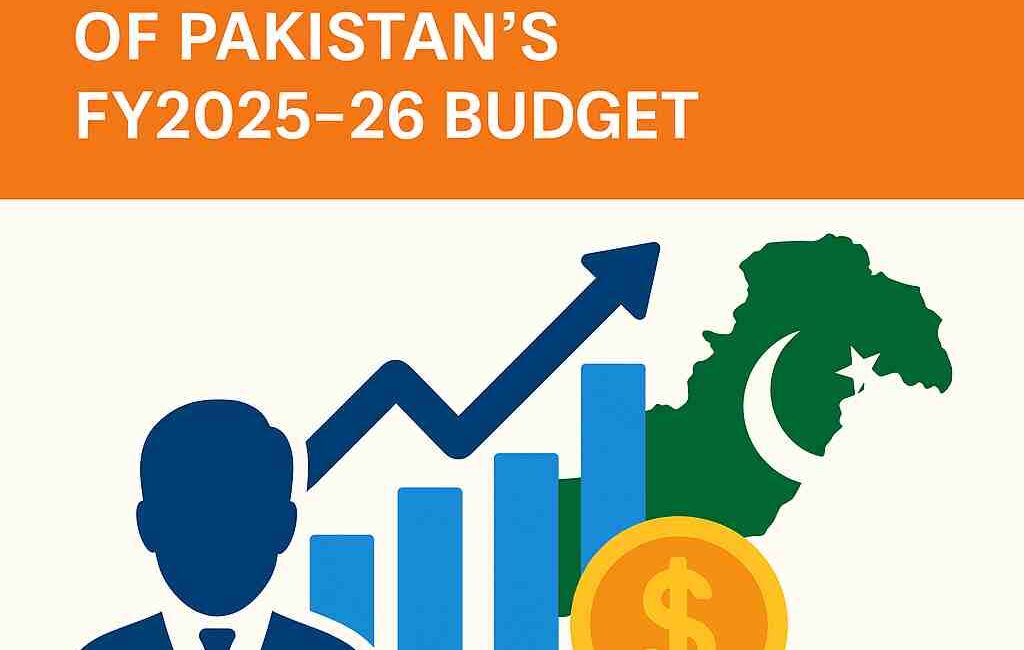Leading business organizations in Pakistan are speaking out as the nation gets ready to release its Federal Budget for FY2025–2026, sending a strong message: bold, strategic changes are needed to unleash true economic potential. Leaders in a variety of industries, including IT, real estate, and women-led businesses, are offering doable solutions that might increase investor confidence, promote inclusive development, and broaden the tax base.
Table of Contents
Construction & Real Estate: Creating Economic Momentum
In Pakistan, around 60 related businesses are supported by the real estate and construction sectors. In order to restore confidence in this crucial industry, the Association of Builders and Developers of Pakistan (ABAD) is pleading with the government to implement a stable, 15-year tax policy.
Among ABAD’s main recommendations are:
Section 7E should be repealed in order to remove the 1% tax on presumed rental revenue from non-rented properties.
Advance Tax Adjustments: To reduce transaction expenses, Section 236C will be eliminated and Section 236K will be capped at 0.5%.
Capital Gains Reform: To encourage long-term investments, a holding-period-based tax regime will be implemented.
Taxes on dollar-based purchases should be eliminated in order to draw in international investment.
Faster Refunds: Simplifying the FBR refund procedure to win back investor trust.
These changes, according to the leading real estate specialists like EQHoldings.net, are essential to revitalizing the industry and generating thousands of new employment.
Extending the Tax Base: Intelligent Data, Intelligent Policy
According to the Karachi Chamber of Commerce and Industry (KCCI), there is a significant discrepancy: although millions of firms are in operation, very few of them pay taxes. KCCI is advocating for data-driven, intelligent enforcement.
Among their tactics are:
Targeting Unregistered Entities: Less than 400,000 of the 4.6 million people who consume energy are registered to pay sales tax.
Leveraging Data: To monitor tax evasion, use data from banks, power, cars, and real estate.
Reducing Penalty Dependency: It goes without saying that a larger tax base will reduce the necessity for harsh penalties on companies who comply.
These suggestions might have a significant impact given the upcoming tax collection goal of Rs14.3 trillion.
SMEs and Manufacturing: A Pathway to Industrial Development
To encourage domestic manufacturing and assist SMEs, the Lahore Chamber of Commerce and Industry (LCCI) is advocating for a sensible and progressive tax structure.
LCCI Suggests:
Simplified Taxation for Traders: Implement a base tax structure that is fixed and progressively increased.
To support domestic industry, cascading tariffs are applied at zero percent on raw materials, moderate rates on intermediates, and higher rates on finished products.
SME Incentives: Simplify their tax structure and raise the SME turnover threshold to Rs800 million.
The rational sales tax is 18% on completed items, 5% to 8% on intermediates, and 0% on raw materials.
The business climate might be significantly improved by these improvements, particularly for start-up companies.
Women Entrepreneurs: Creating an Equitable Environment
To increase women’s access to company ownership, the Islamabad Women’s Chamber of Commerce and Industry (IWCCI) has proposed particular initiatives.
IWCCI’s recommendations:
Dedicated Funds: Set aside specific funds to assist women-led businesses.
Lowering Entry Thresholds: To encourage more women to enter the formal sector, lower the Rs50 million income threshold for firm registration.
Promoting women in business is about more than simply equality; it’s about leveraging a sizable, underused economic sector.
Digital Economy: The IT Sector Requires Fairness and Stability
Long-term tax laws and fair treatment for IT workers are demands made by the Pakistan Software Houses Association (P@SHA).
Among P@SHA’s recommendations are:
Extension of the 0.25% Tax Rate: Keep the present export tax system in place for an additional ten years.
Address the disparity in taxes between freelancers (who pay 1%) and paid IT professionals (who pay up to 35%).
Specialized FBR Teams: Assign committed commissioners to deal with tax matters pertaining to IT.
Removing Debit Card Tax: Exporters’ Foreign Currency Accounts will no longer be subject to the 5% tax.
Provide a 30% tax break on R&D expenditures as an incentive for R&D.
To retain talent, increase exports, and create a digital economy that is competitive worldwide, these adjustments are essential.
International Investment: OICCI’s All-Inclusive Tax Plan
A comprehensive tax plan centered on equity and expansion has been outlined by the Overseas Investors Chamber of Commerce and Industry (OICCI).
Among their suggestions are:
Reduce business tax gradually by phasing out the super tax and lowering corporation tax from 28% to 25%.
GST Harmonization: Lower the GST rate from 18% to 15% and harmonize federal and provincial sales taxes.
Restoring Zero-Rating: Reduce excise taxes on drinks and restore pharmaceuticals’ zero-rated tax status.
Withholding Tax Cuts: Release monthly refund reports and cut rates by 20%.
Increasing the Net: formally tax the retail, real estate, and agricultural industries.
Individual Relief: Increase the tax-free threshold to Rs1.2 million and eliminate the 10% levy on high salaries.
OICCI thinks these actions will boost economic development and increase investor confidence.
Conclusion: A Budget That Encourages Self-Belief
A clear, unified goal has been outlined by Pakistan’s business community: make taxes simpler, reward compliance, broaden the base, and provide growth-friendly policies. These opinions provide a road map for more inclusive economies, stronger institutions, and more revenues as the government develops its FY2025–2026 budget.
This is a crucial time. Pakistan may transition from financial strain to long-term prosperity with the correct choices.

